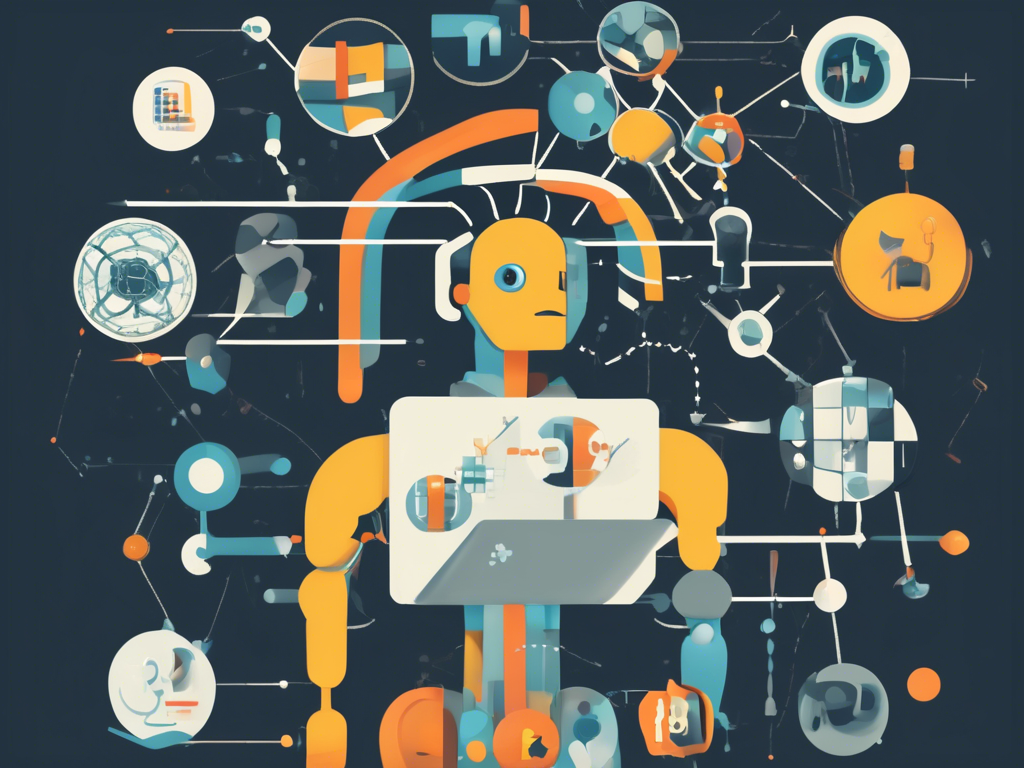The dawn of the digital era has ushered in groundbreaking advancements, and none more transformative than the integration of Artificial Intelligence (AI) into various facets of life. Education, a sector steeped in tradition, stands on the brink of a revolutionary shift as AI begins to weave its way into the very fabric of the learning process. This article delves into the pivotal role of AI in education, exploring how it tailors personalized learning experiences and redefines the teacher’s role. We confront the challenges associated with implementing AI technologies in educational institutions and envision the future classroom equipped with an AI-driven curriculum. Most critically, we assess AI’s tangible impact on student outcomes, a metric crucial to understanding this technological adoption’s success or failure. In doing so, we outline both the immediate and long-term effects that AI could have on our educational systems.
Integrating Artificial Intelligence into the Educational Process

Harnessing AI for Personalized Learning Experiences
The advent of Artificial Intelligence (AI) in education heralds a new era of personalized learning, tailoring educational experiences to meet the unique needs and learning paces of individual students. This transformative approach is not just about automating administrative tasks; it’s about redefining the educational landscape to make learning more accessible, engaging, and effective for everyone.
AI-driven analytics play a pivotal role in this shift, enabling educators to glean insights from student data and identify specific educational needs. By analyzing patterns and performance over time, AI can predict areas where students may struggle and offer tailored content to bridge these gaps. This level of personalization was once beyond the reach of traditional teaching methods, limited by the sheer scale of classroom diversity and the manual efforts required to customize learning paths for each student.
Creating Dynamic Learning Environments
In a personalized learning environment powered by AI, the one-size-fits-all model of education is replaced by dynamic, responsive teaching methods. Interactive AI tutors and chatbots provide real-time assistance and feedback, allowing students to learn at their own pace and on their own terms. These AI systems are designed to adapt to the learner’s progress, offering more challenging materials as proficiency increases or revisiting foundational concepts when necessary.
Moreover, virtual reality (VR) and augmented reality (AR), combined with AI, create immersive learning experiences that were once unimaginable. From exploring the human body in a biology class to walking through historical sites for a history lesson, these technologies make learning vivid and memorable. They also open up new possibilities for students with different learning styles and abilities, making education more inclusive.
Through the integration of AI into the educational process, we are witnessing a paradigm shift towards more personalized, engaging, and effective learning experiences. This not only benefits students by providing them with a more tailored education but also empowers teachers to focus on creativity and critical thinking skills, thus enriching the overall learning environment. As AI technology continues to evolve, its potential to transform education into a more adaptive and immersive experience promises to unlock unprecedented opportunities for students and educators alike.
AI in Education: Transforming the Teacher’s Role
From Traditional Instructor to Facilitator and Guide
The integration of Artificial Intelligence (AI) into educational systems is not just altering how we teach but also redefining the role of the teacher. In a traditional classroom, teachers often find themselves juggling the delivery of content, administrative tasks, and providing personalized feedback to students. With AI’s capability to handle administrative duties and offer customized learning paths for students, teachers can now transition from being the sole source of knowledge to becoming facilitators of learning. This shift emphasizes the teacher’s role in guiding students through their educational journey, encouraging critical thinking, creativity, and problem-solving skills.
AI tools and platforms are designed to take over repetitive tasks such as grading and assessing student progress, allowing teachers more time to focus on designing collaborative and interactive learning experiences. This transformation does not diminish the teacher’s importance but rather elevates it by enabling educators to dedicate their efforts towards fostering deeper connections with their students and facilitating discussions that enhance understanding and retention of knowledge.
Empowering Educators with Data-Driven Insights
The power of AI in education extends beyond student personalization and into the realm of empowering educators with actionable insights. Through the advanced analysis of student data, AI can identify trends and patterns in learning behaviors, highlighting areas where students excel or struggle. This level of insight is invaluable for teachers, as it enables them to tailor their instruction and interventions more effectively, ensuring that no student is left behind.
Moreover, AI-driven analytics can help educators develop more nuanced understandings of individual learner profiles. This capability allows teachers to approach education with a precision previously unattainable, crafting lessons that resonate with each student’s unique needs and learning styles. By harnessing the power of AI for data-driven decision-making, educators can enhance the learning experience, making it more engaging and relevant for every student. In this way, AI does not replace the teacher but rather enhances their ability to implement evidence-based teaching strategies that drive student success.
Through the transformative potential of AI, the educational landscape is evolving to better support both students and teachers. As AI continues to reshape the role of educators, the focus shifts towards a more collaborative, interactive, and personalized learning environment where teachers are pivotal in guiding and nurturing the intellectual and emotional growth of their students.
Overcoming Challenges of AI Implementation in Schools

Addressing Ethical and Privacy Concerns
One of the most pressing challenges in integrating Artificial Intelligence (AI) into educational settings is navigating the complex landscape of ethical and privacy concerns. With the increasing use of AI-driven tools for personalized learning and analytics, safeguarding student data becomes paramount. Schools must establish stringent data protection measures and transparent policies that clarify how student information is collected, used, and stored. This involves not only adhering to existing privacy laws but also anticipating future legislation as technological capabilities evolve. Ensuring that AI systems are designed with built-in privacy features and that all stakeholders, including students, parents, and educators, are well-informed about their rights and responsibilities, is crucial for maintaining trust and integrity within the educational process.
Moreover, ethical considerations extend beyond data privacy to include issues such as bias and fairness. AI algorithms, if not carefully designed and monitored, can perpetuate or even exacerbate biases present in the data they learn from. Educational institutions need to implement regular audits of AI tools to identify and mitigate any potential biases, ensuring that all students have equal access to high-quality, personalized learning experiences. By prioritizing ethical considerations and privacy protection, schools can confidently navigate the challenges associated with AI implementation, creating a safe and equitable learning environment for all.
Fostering Teacher and Student Engagement with AI
Another significant challenge in adopting AI in education is fostering engagement and acceptance among teachers and students. Despite the potential benefits of AI-enhanced learning, its success largely depends on the willingness of educators and learners to embrace these new technologies. Teachers, in particular, may feel apprehensive about integrating AI into their classrooms, concerned about the implications for their roles and the quality of human interactions in education. To overcome this hurdle, professional development programs focused on AI literacy and pedagogical strategies for leveraging AI tools effectively are essential. Providing teachers with the necessary skills and knowledge not only demystifies AI but also empowers them to integrate these technologies in ways that complement and enhance their teaching.
Engaging students with AI requires a thoughtful approach that aligns AI-enhanced learning with their interests and learning styles. Creative use of AI, such as gamification and interactive simulations, can make learning more engaging and relevant. Additionally, involving students in discussions about AI and its role in their education encourages a sense of ownership and agency over their learning experiences. Cultivating a school culture that values innovation and adaptability is key to encouraging both teachers and students to actively participate in AI-enhanced education. By addressing these challenges through proactive strategies and ongoing support, schools can unlock the transformative potential of AI, creating more personalized, efficient, and engaging educational experiences.
The Future Classroom: AI-Driven Curriculum Development
Customizing Learning Material Through AI
The evolution of AI-driven curriculum development signifies a monumental leap towards fully personalized education, where every lesson and material is tailored to the individual student’s learning style, pace, and preferences. This integrated approach goes beyond the occasional personalized assignment to create a whole educational experience that is uniquely customizable for each learner. By harnessing big data and machine learning algorithms, AI systems can analyze a student’s interactions with the material, assessing progress, strengths, and areas needing improvement in real-time. This data then informs the automatic adjustment of curricular content, presenting concepts in ways that resonate best with the student’s learning habits. Such a high level of personalization not only enhances learning outcomes but also keeps students engaged and motivated, significantly reducing dropout rates and fostering a lifelong love for learning.
—
Revolutionizing Assessment with AI
In the future classroom, traditional assessments will transform under the influence of Artificial Intelligence (AI). Gone will be the days of one-size-fits-all tests; instead, AI will enable dynamic assessments that adapt to each student’s level of understanding in real-time. These adaptive testing mechanisms can adjust the difficulty level of questions based on the student’s responses, providing a more accurate representation of their knowledge and skills. Furthermore, AI-driven assessment tools can offer immediate, personalized feedback, highlighting areas of strength and recommending resources for improvement. This shift not only makes testing more fair and comprehensive but also supports a growth mindset, encouraging students to view challenges as opportunities to learn rather than obstacles to their grades. Through AI, educators can spend less time grading and more time on what they do best: inspiring and mentoring students.
By integrating AI into curriculum development and assessment, educators are not just innovating for the sake of technology but are crafting a future where every student has the opportunity to succeed on their own terms. This vision for the future classroom leverages the best of what AI has to offer, ensuring that education is more accessible, engaging, and effective for all.
Evaluating the Impact of Artificial Intelligence on Student Outcomes

Enhancing Academic Achievement Through AI Interventions
The incorporation of Artificial Intelligence (AI) into educational settings has been a game-changer for academic achievement. By tailoring learning experiences to the individual needs of students, AI interventions have demonstrated an unprecedented capacity to enhance both understanding and retention of subject matter. Adaptive learning systems, one of the hallmarks of modern AI in education, dynamically adjust content complexity and learning paths based on student performance. This personalized approach ensures that students are neither under-challenged nor overwhelmed, leading to more effective learning experiences.
Furthermore, AI supports the development of critical thinking skills by providing students with complex problem-solving scenarios tailored to their learning progress. Through interactive simulations and games, learners can engage with material in a hands-on fashion, fostering deeper understanding and application of knowledge. Evidence suggests that students who benefit from AI-enhanced learning environments often exhibit higher levels of engagement, motivation, and self-efficacy in their studies, correlating with improved academic outcomes.
Tracking and Improving Student Well-being with AI
Beyond academic metrics, Artificial Intelligence (AI) plays a crucial role in monitoring and supporting student well-being, a critical component of overall student success. AI-driven platforms can track indicators of emotional and cognitive well-being by analyzing patterns in learning behavior and engagement. For instance, sudden changes in interaction rates or performance can alert educators to potential issues, such as stress, anxiety, or disengagement, allowing for timely intervention.
Moreover, AI has the potential to offer personalized support mechanisms, such as recommending breaks, mindfulness activities, or connecting students with counseling services. These proactive measures can help alleviate stress and promote a healthy balance between academic pursuits and mental health. The impact of such interventions is profound, contributing to a more supportive and nurturing learning environment that recognizes the holistic needs of students. By prioritizing well-being alongside academic achievement, AI-enabled educational tools are redefining what it means to educate the «whole student,» ensuring that learners are not only academically successful but also emotionally and physically healthy.
Through these dual pathways of enhancing academic achievement and supporting student well-being, AI is significantly impacting student outcomes in a positive manner. As technology continues to advance, the potential for AI to further revolutionize the educational landscape remains vast, promising even greater improvements in the way we teach and learn.
Summing up
In considering the journey through which Artificial Intelligence (AI) has navigated the educational landscape, we observe a path marked by innovation and challenges. AI has fostered personalized learning experiences that cater to individual student needs, thereby enhancing engagement and academic performance. It has also instigated a transformational change in the teacher’s role, from sole knowledge provider to facilitator and guide. Yet, the deployment of AI within educational settings is not without its hurdles, demanding critical solutions to issues such as ethical concerns, data privacy, and resource allocation. Looking toward the horizon, the promise of an AI-driven curriculum development suggests a tailored and dynamic approach to education that continuously evolves with student requirements. As we evaluate AI’s influence on education, it is clear that it holds significant promise for shaping student outcomes. To maximize the benefits of AI in education, stakeholders must work collaboratively to ensure that its implementation is equitable, ethical, and enhances the learning experience for all. As we stand at this technological crossroads, the call to action is unequivocal: embrace the potential of AI, while remaining vigilant to navigate its complexities for the betterment of future generations.
